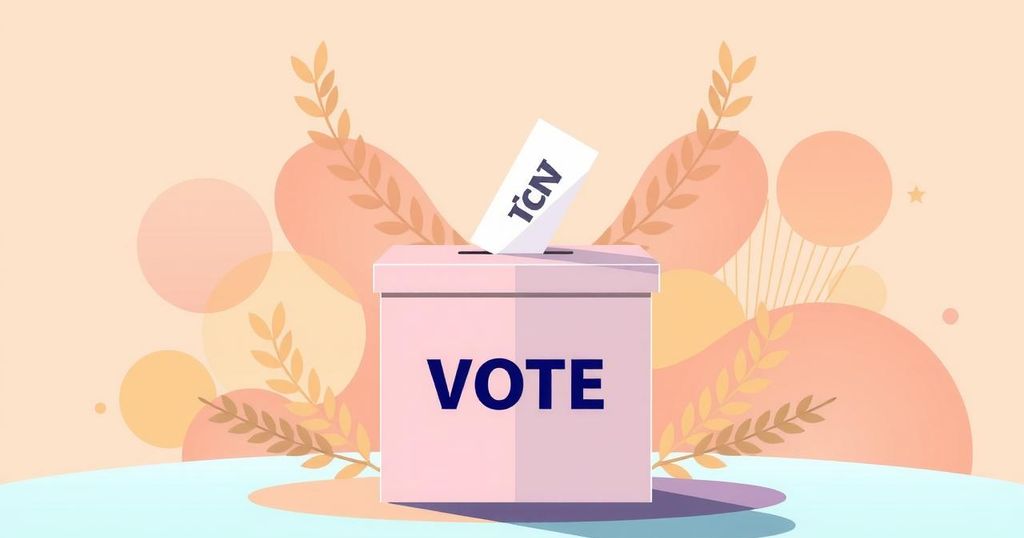Politics
2024 PRESIDENTIAL ELECTION, AFRICA, AP, BRENNAN CENTER FOR JUSTICE, COURT, ELECTION, GHANA, ILLINOIS, MADISON, MAGGIE FREESPIRIT, MINNESOTA, MUSK, NORTH AMERICA, POLITICS, PRESIDENTIAL ELECTION 2024, RAVELY, REPRODUCTIVE RIGHTS, SOROS, SUPREME COURT, THE ASSOCIATED PRESS, UNITED STATES, WA, WISCONSIN
Fatima Khan
0 Comments
Wisconsin’s Supreme Court Election: A High-Stakes Battle Reflecting National Politics
The Wisconsin Supreme Court election has set a record at $59 million in spending, with influences from major donors like Elon Musk. The race between Brad Schimel and Susan Crawford reflects key national issues, including abortion rights and electoral integrity. Concerns over external funding and political affiliations of the candidates shape voter sentiments as this contest emerges as a significant referendum on Trump’s influence and the future of American politics.
Wisconsin has commenced a pivotal state Supreme Court election, characterized by unprecedented financial contributions from affluent donors, including billionaire Elon Musk. This election, projected to cost $59 million, signifies a critical moment in Wisconsin’s political landscape, reflecting broader national ideological conflicts with substantial implications for issues such as abortion rights, voting legislation, and the political trajectory of former President Donald Trump.
The candidates, Republican-affiliated Brad Schimel and Democratic-affiliated Susan Crawford, have polarized public opinion amidst a backdrop of large-scale spending from influential figures on both sides. Early voting in Wisconsin has highlighted local concerns regarding the effects of external financial influencers in what is traditionally a state-focused judicial race, prompting discussions about its implications for vital state issues like abortion and democratic processes.
Voter interviews reveal divergent views on the candidates’ stances. Maggie Freespirit, a retired electrician, expressed her support for Crawford, citing her commitment to abortion rights. In contrast, Steve Ravely from heavily Republican Waukesha endorsed Schimel, emphasizing his alignment with conservative principles regarding immigration and constitutional adherence, while expressing fears about the influence of liberal donors like George Soros.
The electoral contest is marked by extraordinary funding levels, dwarfing previous spending records in Wisconsin elections. Groups associated with Musk alone have contributed over $11 million to Schimel’s campaign, with significant backing from other conservative figures including Donald Trump Jr. Meanwhile, Democratic efforts feature prominent financial support from donors like George Soros and Governor J.B. Pritzker, with proactive engagement from leaders like Minnesota Governor Tim Walz, emphasizing the necessity of countering Musk’s influence.
Activism aimed at mobilizing voters of color is also pivotal in this election. Angela Lang from Black Leaders Organizing Communities underscored her group’s commitment to local engagement, contrasting their consistent outreach with the influence of outside power players. This ongoing decisive contest is viewed by many as a judgment on Musk’s financial power in politics and its potential implications for Trump’s political ambitions.
Schimel openly embraces Trump’s endorsement, often appearing at events with pro-Trump allies. His campaign strategy includes minimizing concerns about Musk’s influence, suggesting Trump’s backing could enhance his visibility to occasional voters. His recent appearance at a rally solidified his alignment with Trump’s agenda, showcasing the intersection of state judicial elections with national partisan politics.
As the election conclusion approaches, both sides amplify their efforts to ensure high voter turnout. Musk-affiliated campaigns urge voters to support Schimel in protecting Trump’s political agenda, while Crawford’s supporters portray the election as a struggle against the overwhelming influence of right-wing billionaires. The outcome holds significant ramifications for the governance of the Wisconsin Supreme Court and potentially the governance surrounding the upcoming presidential election in 2028, marking this race as a formidable battleground in American politics.
In summary, the Wisconsin Supreme Court election has escalated into a pivotal contest, underscored by record-breaking financial contributions and high-stakes political affiliations. Concerns about the influence of outsiders like Elon Musk have emerged alongside debates about fundamental issues such as abortion and voting rights. With both candidates representing starkly different ideologies and motives, the implications of this election extend beyond state lines, potentially affecting the future political landscape of the nation.
Original Source: www.newsweek.com




Post Comment